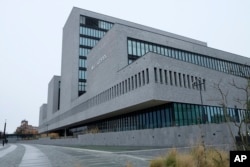Europol, the European Union's law enforcement agency, said Thursday it has arrested five people in an online criminal enterprise and seized 39 computer servers following a four-year-long international investigation.
Police agencies spanning the globe and representing 30 countries participated in the effort, which closed down a criminal group that has caused hundreds of millions of dollars in damage through online cyberattacks, according to a written statement released by Europol.
"The operation marks the largest-ever use of sinkholing to combat botnet infrastructures and is unprecedented in its scale, with over 800,000 domains seized, sinkholed or blocked," the statement read.
Sinkholing refers to a technique used by police that redirects internet traffic coming from criminals to servers controlled by law enforcement. When fully implemented, the tactic stops criminals from gaining access to infected computers of their victims.
Eurojust President Michele Coninsx called the cybercrime group, known as Avalanche, "one of the world's largest and most malicious botnet infrastructures" and said its take-down by authorities was one of the biggest to date.
"Today marks a significant moment in the fight against serious organized cybercrime, and exemplifies the practical and strategic importance of Eurojust in fostering international cooperation," Coninsx said in a statement issued by the European judicial cooperation agency.
Members of the Avalanche group were able to gain access to a bank and email passwords of millions of victims after infecting computers with malware. Once the hackers took control of their victims' computers, they were able to draw money from their bank accounts.
According to Europol, the Avalanche network contained around 500,000 infected computers around the world on any given day.
Once the money was pilfered from a victim's bank account, the criminals used several highly organized networks of mules to purchase goods, which enabled them to launder the illicitly obtained money.
The criminal infrastructure had been in place for about three years before police began their investigation in 2012.
Europol Director Rob Wainwright called the investigation and take-down of Avalanche "highly significant" and pointed to it as a model for handling international cybercrime in the future.
"The complex transnational nature of cyber investigations requires international cooperation between public and private organizations at an unprecedented level to successfully impact on top-level cybercriminals," he said. "Avalanche has shown that through this cooperation, we can collectively make the internet a safer place for our businesses and citizens."





